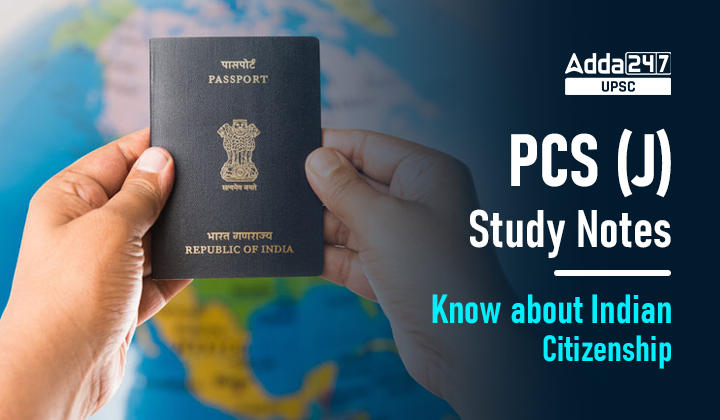Table of Contents
Indian Citizenship
A person is considered a citizen if they are recognized by the law as being a citizen of a sovereign state or a member of a nation. According to the Constitution, citizenship is a matter that falls under the exclusive authority of Parliament because it is included in the Union List. Provisions regarding Citizenship has been given in Articles 5 – Article 11 of the Indian Constitution. Legislation pertaining to citizenship is included in the Citizenship Act of 1955. The Citizenship (Amendment) Act of 1986, the Citizenship (Amendment) Act of 1992, the Citizenship (Amendment) Act of 2003, and the Citizenship (Amendment) Act of 2005 have all amended the Act respectively this.
Under the Citizenship Act of 1955, there are four paths to becoming a citizen of India:
A person is an Indian citizen by birth if a
- person born in India on or after 26.01.1950 but before 01.07.1987
- person born in India between 01.07.1987 and 02.12.2004 given either of his/her parents is a citizen of the country at the time of his/her birth.
- person born in India on or after 3.12.2004 given both his/her parents are Indians or at least one parent is a citizen and the other is not an illegal migrant at the time of birth.
A person is an Indian citizen by descent if a
- person born outside India on or after January 26, 1950 and his/her father was a citizen of India by birth.
- person born outside India on or after December 10, 1992, but before December 3, 2004 and either of his/her parent was a citizen of India by birth.
- person born outside India or or after December 3, 2004 has to acquire citizenship, his/her parents have to declare that the minor does not hold a passport of another country and his/her birth is registered at an Indian consulate within one year of birth.
By following the necessary procedures, it is also possible to obtain citizenship by registration. Citizenship by naturalisation is available to anyone who have been permanent residents of India for 12 years and who meet all of the requirements listed in the Act’s third schedule. However, the Act does not permit holding two different nationalities at the same time.
भारतीय नागरिकता
एक व्यक्ति को एक नागरिक माना जाता है यदि उन्हें कानून द्वारा एक संप्रभु राज्य के नागरिक या किसी राष्ट्र के सदस्य के रूप में मान्यता दी जाती है। संविधान के अनुसार, नागरिकता एक ऐसा मामला है जो संसद के अनन्य अधिकार के अंतर्गत आता है क्योंकि यह संघ सूची में शामिल है। 1986 के नागरिकता (संशोधन) अधिनियम, 1992 के नागरिकता (संशोधन) अधिनियम, 2003 के नागरिकता (संशोधन) अधिनियम और 2005 के नागरिकता (संशोधन) अधिनियम ने क्रमशः इस अधिनियम में संशोधन किया है।
1955 के नागरिकता अधिनियम के तहत, भारत का नागरिक बनने के चार रास्ते हैं:
एक व्यक्ति जन्म से एक भारतीय नागरिक है यदि
- व्यक्ति का जन्म भारत में 26.01.1950 को या उसके बाद लेकिन 01.07.1987 से पहले हुआ हो
- व्यक्ति का जन्म 01.07.1987 और 02.12.2004 के बीच हुआ हो, बशर्ते उसके माता-पिता में से कोई भी अपने जन्म के समय देश का नागरिक हो।
- 12.2004 को या उसके बाद भारत में पैदा हुआ व्यक्ति, बशर्ते उसके माता-पिता दोनों भारतीय हों या कम से कम एक माता-पिता नागरिक हों और दूसरा जन्म के समय अवैध प्रवासी न हो।
एक व्यक्ति वंश के आधार पर भारतीय नागरिक है यदि
- 26 जनवरी, 1950 को या उसके बाद भारत से बाहर पैदा हुआ व्यक्ति और उसके पिता जन्म से भारत के नागरिक थे।
- 10 दिसंबर 1992 को या उसके बाद भारत के बाहर पैदा हुआ व्यक्ति, लेकिन 3 दिसंबर, 2004 से पहले और उसके माता-पिता में से कोई भी जन्म से भारत का नागरिक था।
- भारत से बाहर या 3 दिसंबर, 2004 के बाद पैदा हुए व्यक्ति को नागरिकता प्राप्त करनी है, उसके माता-पिता को यह घोषित करना होगा कि नाबालिग के पास दूसरे देश का पासपोर्ट नहीं है और उसका जन्म एक वर्ष के भीतर भारतीय वाणिज्य दूतावास में पंजीकृत है।
आवश्यक प्रक्रियाओं का पालन करके पंजीकरण द्वारा नागरिकता प्राप्त करना भी संभव है। देशीयकरण द्वारा नागरिकता उन सभी के लिए उपलब्ध है जो 12 वर्षों से भारत के स्थायी निवासी हैं और जो अधिनियम की तीसरी अनुसूची में सूचीबद्ध सभी आवश्यकताओं को पूरा करते हैं। हालांकि, अधिनियम एक ही समय में दो अलग-अलग राष्ट्रीयताओं को रखने की अनुमति नहीं देता है।



 TSPSC Group 1 Question Paper 2024, Downl...
TSPSC Group 1 Question Paper 2024, Downl...
 TSPSC Group 1 Answer key 2024 Out, Downl...
TSPSC Group 1 Answer key 2024 Out, Downl...
 UPSC Prelims 2024 Question Paper, Downlo...
UPSC Prelims 2024 Question Paper, Downlo...
